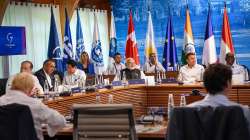G7 Summit: PM Modi invites rich nations to tap huge market for clean energy technologies in India
In his remarks at the session on 'Investing in a better Future: Climate, Energy, Health' at the G7 Summit, Modi highlighted India's track record and said it has achieved the target of 40 per cent energy-capacity from non-fossil sources nine years before time.

G7 Summit: Asserting that India's dedication to climate commitments is evident from its performance, Prime Minister Narendra Modi on Monday hoped that rich countries of G-7 will support India's efforts in combating climate change and invited them to tap the huge market for clean energy technologies emerging in the country.
In his remarks at the session on 'Investing in a better Future: Climate, Energy, Health' at the G7 Summit, Modi highlighted India's track record and said it has achieved the target of 40 per cent energy-capacity from non-fossil sources nine years before time.
"The target of 10 per cent ethanol-blending in petrol has been achieved 5 months before time. India has the world's first fully solar power operated airport. India's huge railway system will become net zero in this decade," he said.
"When a large country like India shows such ambition, other developing countries also get inspiration. We hope that the rich countries of G-7 will support India's efforts.
Today, a huge market for clean energy technologies is emerging in India," the prime minister said.
G-7 countries can invest in research, innovation, and manufacturing in this field, he added.
The scale that India can provide for every new technology can make that technology affordable for the whole world, he asserted.
The core theories of the circular economy have been an integral part of Indian culture and lifestyle, Modi said.
"I called for a movement called LIFE -- Lifestyle for Environment -- in Glasgow last year. This year on World Environment Day, we launched the Global Initiative for LiFE campaign. The goal of this campaign is to encourage an eco-friendly lifestyle," he said.
"We can call the followers of this movement Triple-P i.e. 'pro planet people', and we should all take the responsibility of increasing the number of Triple-P people in our own countries. This will be our greatest contribution to the coming generations," he said.
Modi, who is in Germany on a two-day visit from Sunday for the summit of the G7, was received by German Chancellor Olaf Scholz upon his arrival at Schloss Elmau, the picturesque venue of the summit in southern Germany.
In his remarks at the session, Modi said unfortunately, it is believed that there is a fundamental collision between the developmental goals of the world and environmental protection.
There is also another misconception that poor countries and poor people cause more damage to the environment, he said, adding that India's history of over thousands of years completely refutes this view.
"Ancient India has seen a time of immense prosperity; then we have also tolerated the centuries of slavery, and now independent India is the fastest-growing big economy in the whole world. But during this whole period, India did not let its commitment to the environment get diluted even a single bit," Modi asserted.
Noting that 17 per cent of the world’s population resides in India, Modi said the country's contribution to global carbon emissions is only 5 per cent.
"The main reason behind this is our lifestyle, which is based on the theory of coexistence with nature," he said.
He stressed that energy access should not be the privilege of the rich only and a poor family also has the same rights on energy.
"And today when energy costs are sky-high due to geopolitical tensions, it is more important to remember this thing. By taking inspiration from this principle, we delivered LED bulbs and clean cooking gas door-to-door in India and showed that millions of tons of carbon emissions can be saved while ensuring energy for the poor," he said.
Talking about the health sector, Modi said human and planet health are interconnected and therefore, we have adopted the approach of 'one world, one health'.
"During the pandemic, India found many creative ways to use digital technology in the health sector. G7 countries can help India to take these innovations to other developing countries," he said.
"Recently we all celebrated the International Day of Yoga. In times of the Covid crisis, yoga has become a great tool for preventive health for people all over the world, this helped many people to maintain their physical and mental health," Modi said.
Apart from yoga, there is a valuable asset of traditional medicine in many countries of the world including India, which can be used for holistic health, the prime minister said.
"I am glad that recently WHO decided to set up its Global Centre for Traditional Medicine in India. This centre will not only become a repository of different traditional medicine systems all over the world but will also encourage more research in this area. It will benefit all the citizens of the world," he said.
Ministry of External Affairs Spokesperson Arindam Bagchi, in a tweet on the prime minister's participation in the session, said, "Becoming pro-planet people. Investing in a better future. In the @G7 session on climate, energy & health, PM @narendramodi highlighted India’s efforts for green growth, clean energy, sustainable lifestyles & global wellbeing."
The Group of Seven (G7) is an inter-governmental political grouping consisting of Canada, France, Germany, Italy, Japan, the UK and the US.
The German Presidency has invited Argentina, India, Indonesia, Senegal and South Africa to the G7 Summit in Elmau, Bavaria.
Modi is attending the G7 summit held in the Alpine castle of Schloss Elmau in southern Germany following an invitation by German Chancellor Scholz.
ALSO READ | Chidambaram slams PM Modi over G7 remarks in Germany; says 'govt continuing work of previous dispensations'
ALSO READ | G7 Summit: Bonhomie at display! US President Joe Biden walks up to greet PM Modi | Watch